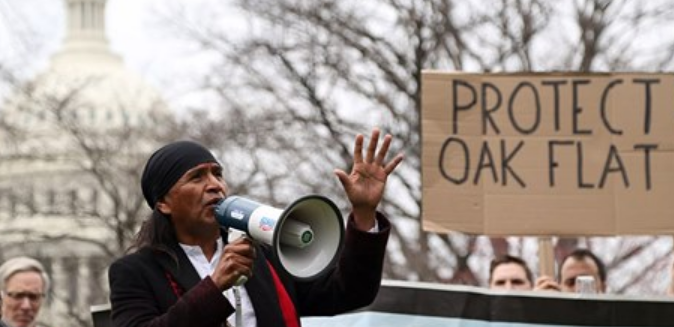
- Details
- By Levi Rickert
The decade-long fight by the Apache Stronghold, a nonprofit organization composed of the some tribal citizens of San Carlos Tribe and other Native Americans,sustained a severe blow on Friday when the 9th U.S. Circuit Court of Appeals in a close 6-5 ruled in favor of Rio and BHP for the Resolution Copper project.
The project will allow for the destruction of Oak Flat, in Apache known as Chi’chil Biłdagoteel, that has been a gathering space for sacred ceremonies for time immemorial for the Apache and other Native American tribes.
Apache Stronghold leader Wendsler Nosie vowed to appeal the Friday’s decision to the U.S. Supreme Court.
"Oak Flat is like Mount Sinai to us — our most sacred site, where we connect with our Creator, our faith, our families and our land," Nosie said. "Today's ruling targets the spiritual lifeblood of my people, but it will not stop our struggle to save Oak Flat."
The land deal between the U.S Forest Service and corporation in a last-minute provision was inserted into a 2014 must-pass defense bill authorizing the transfer of Oak Flat to Resolution Copper, a foreign-owned mining company that plans to turn the sacred site into a two-mile-wide and 1,100-foot-deep crater.
"This ruling is illogical and it's unjust," said Luke Goodrich, a Becket Law attorney who represents Apache Stronghold. The group intends to appeal to the Supreme Court and feels it has a strong case given how closely divided the appeals court was, Goodrich added.
On Sunday, the San Carlos Apache Tribe issued a press release saying “while the 9th Circuit Court of Appeals ruling Friday, March 1, 2024 against the non-profit citizens group Apache Stronghold is extremely disappointing, the ruling does not clear the way for construction of the Resolution Copper Mine.”
“The culturally and environmentally devastating Resolution project is no closer to construction today than it was before the appeals court ruling,” San Carlos Apache Tribe Chairman Terry Rambler continued in the press release. “The Tribe will continue to fight construction of the project that would have devastating impacts to the Tribe’s culture, the environment and Arizona’s drinking water supplies.”
The Trump Administration pushed through Resolution’s deeply flawed Environmental Impact Statement (EIS) in the last week of Trump’s presidency.
The Biden Administration subsequently withdrew the EIS because it failed to address the irreparable harm this mine would inflict on the environment and Apache culture.
“The Biden Administration correctly withdrew the deeply flawed report and should never reissue the environmental study,” Chairman Rambler said. “The Tribe appreciates President Biden’s leadership in ensuring the federal government honors its solemn commitments to tribes, including the protection of sacred areas on federal land.”
There are also two outstanding federal lawsuits – including one filed by the San Carlos Apache Tribe – that have yet to be litigated. These suits raise multiple critical arguments on why this mine should not be allowed to move forward.
The United States already exports one-third of the copper produced in its mines because there is not enough smelter capacity to process the country’s raw copper into finished metal. Resolution has stated it does not intend to build a new smelter. China operates nine of the 20 largest copper smelters in the world and is the world’s largest importer of raw copper concentrate.
“All the evidence points to the fact that Rio Tinto and BHP will export Resolution’s copper overseas to China. This is a national security threat that will bolster China’s economy at the expense of all Americans.” Chairman Rambler stated. “The Resolution Mine is clearly not in the best interest of the Tribe, the citizens of Arizona, and American taxpayers and must be stopped.”
More Stories Like This
Chickasaw Lighthorse Police Officer named Indian Country Law Enforcement Officer of the YearIndian Gaming Association Rallies Broad Coalition Against Sports Event Contracts It Calls Illegal Threat to Tribal Sovereignty
Navajo Resources and Development Committee Issues Notice on Livestock Inspection Requirements
American Prairie, Tribal Coalition Files Protest Over Rescinded Grazing Rights
Northern Cheyenne Push Back Against Trump Administration’s Effort to Alter Little Bighorn History
Help us defend tribal sovereignty.
At Native News Online, our mission is rooted in telling the stories that strengthen sovereignty and uplift Indigenous voices — not just at year’s end, but every single day.
Because of your generosity last year, we were able to keep our reporters on the ground in tribal communities, at national gatherings and in the halls of Congress — covering the issues that matter most to Indian Country: sovereignty, culture, education, health and economic opportunity.
That support sustained us through a tough year in 2025. Now, as we look to the year ahead, we need your help right now to ensure warrior journalism remains strong — reporting that defends tribal sovereignty, amplifies Native truth, and holds power accountable.
 The stakes couldn't be higher. Your support keeps Native voices heard, Native stories told and Native sovereignty defended.
The stakes couldn't be higher. Your support keeps Native voices heard, Native stories told and Native sovereignty defended.
Stand with Warrior Journalism today.
Levi Rickert (Potawatomi), Editor & Publisher


